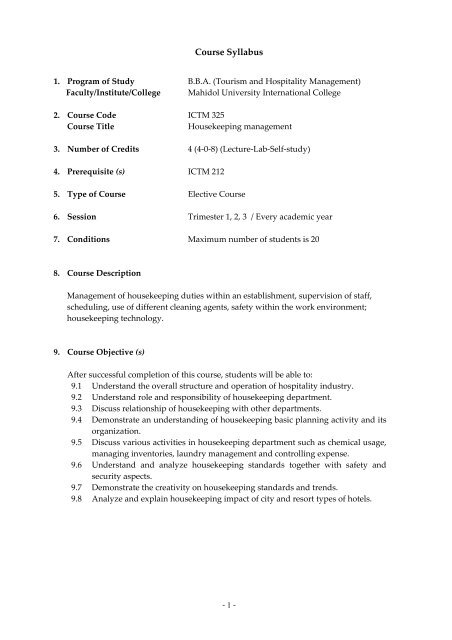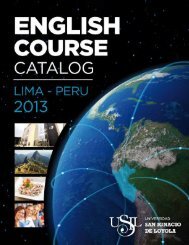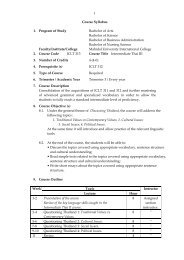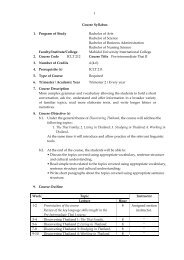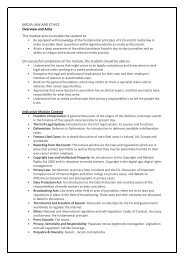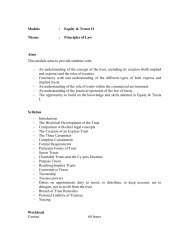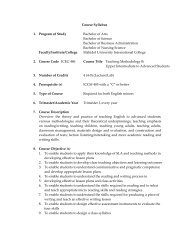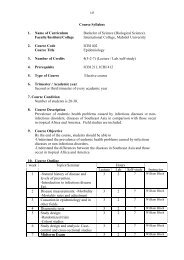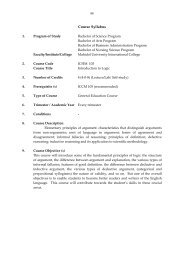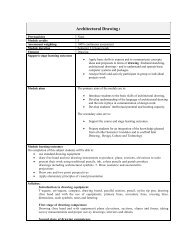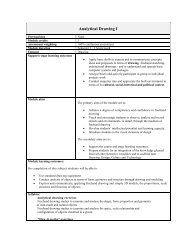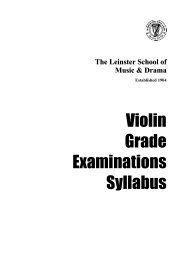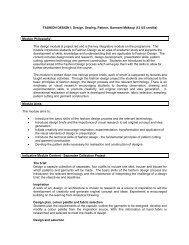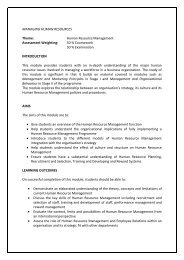Course Syllabus - Mahidol University International College
Course Syllabus - Mahidol University International College
Course Syllabus - Mahidol University International College
You also want an ePaper? Increase the reach of your titles
YUMPU automatically turns print PDFs into web optimized ePapers that Google loves.
<strong>Course</strong> <strong>Syllabus</strong><br />
1. Program of Study B.B.A. (Tourism and Hospitality Management)<br />
Faculty/Institute/<strong>College</strong> <strong>Mahidol</strong> <strong>University</strong> <strong>International</strong> <strong>College</strong><br />
2. <strong>Course</strong> Code ICTM 325<br />
<strong>Course</strong> Title<br />
Housekeeping management<br />
3. Number of Credits 4 (4‐0‐8) (Lecture‐Lab‐Self‐study)<br />
4. Prerequisite (s) ICTM 212<br />
5. Type of <strong>Course</strong> Elective <strong>Course</strong><br />
6. Session Trimester 1, 2, 3 / Every academic year<br />
7. Conditions Maximum number of students is 20<br />
8. <strong>Course</strong> Description<br />
Management of housekeeping duties within an establishment, supervision of staff,<br />
scheduling, use of different cleaning agents, safety within the work environment;<br />
housekeeping technology.<br />
9. <strong>Course</strong> Objective (s)<br />
After successful completion of this course, students will be able to:<br />
9.1 Understand the overall structure and operation of hospitality industry.<br />
9.2 Understand role and responsibility of housekeeping department.<br />
9.3 Discuss relationship of housekeeping with other departments.<br />
9.4 Demonstrate an understanding of housekeeping basic planning activity and its<br />
organization.<br />
9.5 Discuss various activities in housekeeping department such as chemical usage,<br />
managing inventories, laundry management and controlling expense.<br />
9.6 Understand and analyze housekeeping standards together with safety and<br />
security aspects.<br />
9.7 Demonstrate the creativity on housekeeping standards and trends.<br />
9.8 Analyze and explain housekeeping impact of city and resort types of hotels.<br />
- 1 -
10. <strong>Course</strong> Outline<br />
Hours<br />
Week Topics Lecture Lab Self‐<br />
Study<br />
Overall structure and operation of hospitality<br />
industry<br />
• Hotel organization chart and its reporting<br />
1<br />
line<br />
• Knowledge of overall operation of each<br />
4 0 8<br />
department<br />
• General relationship of each department<br />
and how it functions<br />
Role of housekeeping and its relationship<br />
with other departments<br />
• Housekeeping department and its role and<br />
2 responsibility<br />
4 0 8<br />
• Housekeeping organization chart<br />
• Positions and job descriptions in<br />
housekeeping department<br />
Role of housekeeping and its relationship<br />
with other departments<br />
3<br />
• Relationship of housekeeping department<br />
with others particularly front office, food<br />
4 0 8<br />
and beverage as well as engineering<br />
departments<br />
Planning and organizing housekeeping<br />
department<br />
• Planning the work in housekeeping<br />
department<br />
4 • Area inventory<br />
4 0 8<br />
• Frequency schedule<br />
• Performance standard<br />
• Productivity standard<br />
• Supply and equipment inventory level<br />
Housekeeping standards / trends<br />
5 • Housekeeping standard building<br />
4 0 8<br />
• Various standard set up<br />
6 Human resource and training employees in<br />
housekeeping<br />
• Staffing and training employees<br />
4 0 8<br />
• Motivating employees<br />
7 Group presentations<br />
• Chemical usage<br />
• Laundry management<br />
4 0 8<br />
• Managing inventories<br />
• Controlling expense<br />
Instructor<br />
Tevabanchachai,<br />
N.<br />
- 2 -
Hours<br />
Week Topics Lecture Lab Self‐<br />
Study<br />
8 Field trip 4 0 8<br />
Safety and security<br />
• What safety and security is<br />
9<br />
4 0 8<br />
• How safety and security play roles in<br />
housekeeping operation<br />
Guest speaker from industry<br />
10 • Room set up project discussion<br />
4 0 8<br />
• Submission of analysis report<br />
Room set up project at Salaya Pavilion:<br />
students are to be given with requirement of<br />
the room set up concept as well as budget.<br />
11 Students are required to discuss and prepare 4 0 8<br />
plan in group as well as budget and to conduct<br />
an actual room set up at one of the rooms at<br />
Salaya Pavilion Hotel.<br />
Total 44 0 88<br />
Final Examination<br />
Instructor<br />
Tevabanchachai,<br />
N.<br />
NB. The course is subject to change without prior notice to fit the changing tourism circumstances.<br />
11. Teaching Method (s)<br />
11.1. Lectures<br />
11.2. Discussion<br />
11.3. In‐class exercises<br />
11.4. Practicum<br />
11.5. Self‐study<br />
12. Teaching Media<br />
12.1. LCD overhead projector<br />
12.2. PowerPoint<br />
12.3. Multimedia resources<br />
12.4. Handouts<br />
12.5. Text books<br />
13. Measurement and evaluation of student achievement<br />
Student achievement is measured and evaluated by<br />
13.1 the ability in understanding the overall structure and operation of hospitality<br />
industry.<br />
13.2 the ability in understanding role and responsibility of housekeeping department.<br />
- 3 -
13.3 the ability in discussing relationship of housekeeping with other departments.<br />
13.4 the ability in demonstrating an understanding of housekeeping basic planning<br />
activity and its organization.<br />
13.5 the ability in discussing various activities in housekeeping department such as<br />
chemical usage, managing inventories, laundry management and controlling<br />
expense.<br />
13.6 the ability in understanding and analyzing housekeeping standards together with<br />
safety and security aspects.<br />
13.7 the ability in demonstrating the creativity on housekeeping standards and trends.<br />
13.8 The ability in analyzing and explaining housekeeping impact of city and resort<br />
types of hotels.<br />
Student’s achievement will be graded according to the faculty and university standard<br />
using the symbols: A, B+, B, C+, C, D+, D, and F.<br />
Students must have attended at least 80% of the total class hours of this course.<br />
Ratio of mark<br />
1. Class attendance 5%<br />
2. Professionalism during field trip 10%<br />
3. Group project 30%<br />
4. Report analysis 25%<br />
5. Written final examination 30%<br />
Total 100 %<br />
14. <strong>Course</strong> evaluation<br />
14.1. Students’ achievement as indicated in number 13 above.<br />
14.2. Students’ satisfaction towards teaching and learning of the course using<br />
questionnaires.<br />
15. Reference (s)<br />
Casado, M. (2000) Housekeeping Management. New York: John Wiley and Sons, Inc.<br />
Martin, R. (1998) Professional Management of Housekeeping Operations. (3 rd ed.). New York:<br />
John Wiley and Sons, Inc.<br />
Kappa, M., Nitschke, A. and Schappert, P. (1995) Housekeeping Management. New York:<br />
Educational Institute of the American Hotel and Motel Association.<br />
- 4 -
16. Instructor (s)<br />
Nate‐tra Tevabanchachai<br />
Lecturer<br />
Travel Industry Management Division<br />
<strong>Mahidol</strong> <strong>University</strong> <strong>International</strong> <strong>College</strong><br />
17. <strong>Course</strong> Coordinator<br />
Nate‐tra Tevabanchachai<br />
Travel Industry Management Division<br />
<strong>Mahidol</strong> <strong>University</strong> <strong>International</strong> <strong>College</strong><br />
Tel. +66 (0) 2441‐4090 ext. 1221<br />
Fax +66 (0) 2441‐9745<br />
Email icnatetra@mahidol.ac.th<br />
18. Additional Information<br />
Class Policy:<br />
• Students are required to be punctual at all times; attendance, assignments etc.<br />
• Students are expected to be well‐groomed and perform professionally according to the<br />
MUIC rules and regulations.<br />
• Students must fulfill the minimum requirement of 80% of total class attendance.<br />
Failure to meet this requirement will not be eligible for the final examination.<br />
• Medical certificate is required for any class absenteeism.<br />
Group assignment: Group project (4 groups)<br />
Assignment title: 1. Chemical usage<br />
2. Controlling expense<br />
3. Laundry management<br />
4. Managing inventories<br />
Due date:<br />
To be discussed (depends on the number of students in the class)<br />
Assignment Overview:<br />
Overall Aim:<br />
Students are required to conduct a research on the topic assigned<br />
and are expected to interview the housekeeping manager on<br />
specific. Furthermore, students will present the topic in the class (30<br />
minutes) in order to demonstrate their understanding on the topics<br />
and deliver knowledge with classmates.<br />
Allow students to conduct self‐study and research and provide<br />
opportunities for them to discuss with the practitioner(s) in order to<br />
gain practical knowledge.<br />
- 5 -
Learning Outcomes:<br />
- To be able to understand and discuss the assigned topic.<br />
- To be able to share knowledge with classmates.<br />
- To be able to work as a team.<br />
Instruction:<br />
1. One group should consist of 5 members.<br />
2. Each group will be assigned with the topic.<br />
3. Students are expected to conduct interview with housekeeping manager at a hotel.<br />
4. Students are given freedom in choosing the hotel, but please consult the lecturer<br />
before hand.<br />
5. Group presentation is required and each member must contribute in presenting.<br />
6. Group presentation takes 30 minutes.<br />
7. Report must be completed with a one A4‐page of individual learning from the<br />
project.<br />
8. Original report must given to the lecturer and a copy must be given to the<br />
classmates after the presentation.<br />
Task and weighting (30%):<br />
Presentation:<br />
‐ Thorough, logical and quality information of the topic assigned (both written and<br />
presentation) 10%<br />
‐ Actual presentation must be well‐covered, creative and understandable 10%<br />
‐ Individual learning report must come with group report 5%<br />
‐ Group members demonstrate the understanding of the topics when being questioned by<br />
classmates. 5%<br />
___<br />
Total 30%<br />
Remarks: Please refer to the lecturer if there is any concern or any further clarification your<br />
group may need.<br />
Individual assignment: Analysis report on housekeeping impact on resort and city hotels<br />
Due date: Week 10<br />
Overview: Students will be brought to the field trip to pay a visit at a resort hotel. Drawing<br />
experiences from the field trip and the interview that each group conducts at the city hotel of<br />
first assignment, students are to produce an individual analysis report explaining the impact<br />
of housekeeping comparing between city and resort hotels.<br />
- 6 -
Over all aim: To allow students to explore their experiences and to come up with the<br />
conclusion regarding housekeeping aspect of hotels / resorts they visited.<br />
Learning outcomes:<br />
- To be able to understand the differences of housekeeping of both city and resort<br />
perspectives.<br />
- To be able to discuss and explain the impact of the above hotel types with one own<br />
observation, theory learned and practical experiences received throughout the course.<br />
Task and weighting (30%):<br />
Report:<br />
‐ Good format and structure of the report 5%<br />
‐ Relevancy of the housekeeping impact is clearly explained 15%<br />
‐ Logical, thorough, accurate information is well – covered in the report 10%<br />
___<br />
Total 30%<br />
Remarks: Please refer to the lecturer if there is any concern or any further clarification your<br />
group may need.<br />
- 7 -


